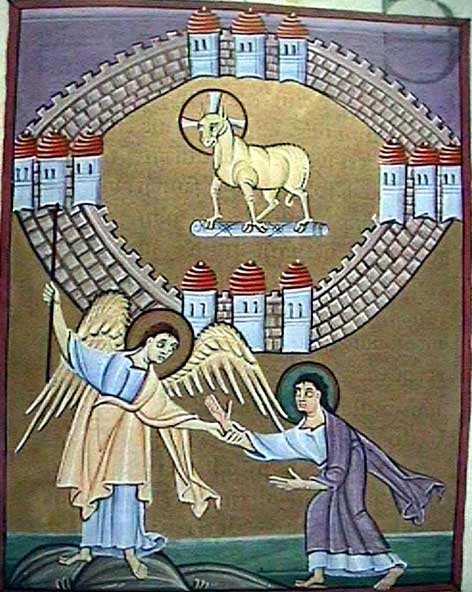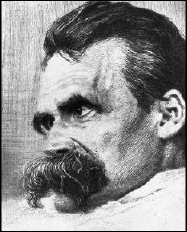 Usually courteous bloggers who value their readership announce their intentions to take a break for awhile. Some even tell them when they can be expected to be back. If anyone is still reading this cyber-rag, which I highly doubt, they'll have to settle for much, much less -but at least they're used to that - namely, the announcement that I just took a break. Not a very useful report, I know, especially since that blogging vacation was time off from what was some rather infrequent posting in the first place; but the break is over and I'm resolved to make 2007 much more fruitful.
Usually courteous bloggers who value their readership announce their intentions to take a break for awhile. Some even tell them when they can be expected to be back. If anyone is still reading this cyber-rag, which I highly doubt, they'll have to settle for much, much less -but at least they're used to that - namely, the announcement that I just took a break. Not a very useful report, I know, especially since that blogging vacation was time off from what was some rather infrequent posting in the first place; but the break is over and I'm resolved to make 2007 much more fruitful.One of the posts I'm looking forward to in January will be an interview with author and professor of Old Testament and Biblical hermeneutics at Westminster Theological Seminary, Dr. Peter Enns (whose book I reviewed here and here as well as responding to criticisms of my review here) - so look for that.
 The result of posting more frequently will probably be an increase in rabid raving about some topic or another. The new blogger allows for labels, so I've added them to all of my previous posts for easier access - so now I can finally be properly cited in magazines dedicated to interior decorating, budget haircare and preteen gossip. In any case, please accept my apologies, dear hypothetical readers, and expect your compensatory gift baskets to arrive soon. In the meantime, accept the offering of my slightly updated template.
The result of posting more frequently will probably be an increase in rabid raving about some topic or another. The new blogger allows for labels, so I've added them to all of my previous posts for easier access - so now I can finally be properly cited in magazines dedicated to interior decorating, budget haircare and preteen gossip. In any case, please accept my apologies, dear hypothetical readers, and expect your compensatory gift baskets to arrive soon. In the meantime, accept the offering of my slightly updated template.And now, with the sole interest of drawing attention to myself via the magic of technorati, I will insidiously link the posts of various Christian blogs that I'd like to use in order to get myself mentioned or attract their readers:
Mike Bird has some interesting comments on Tom Wright's Simply Christian.
The illustrious internet monk, Michael Spencer diverges from many critics in his review of Apocalypto.
Phil Johnson charitably links someone who only mentions him in order to get linked. How shameful, yet shameless.
Regardless of the odd (as in occasional AND strange) post on postmodernism, Doug Wilson proves once again that his voice is worthy to be heard.
Ben Myers lists several outstanding moments in blogging from 2006.
Scot McKnight comments on a book called The End of Memory by a theologian named Miroslav Volf, who my brother has really enjoyed at Yale.
The Tall Skinny Kiwi discusses the merits of John Piper's book on depression, which after reading his post, I think I'll be picking up immediately.
John Frye breaks the pattern of dismal reactions I've heard about the Christmas release of The Nativity Story.
Alan Bandy, who was into the word Apocalypto before it was cool, had a fantastic Christmas post that I think you'll enjoy as much as I did.
Chris Tilling posted a fantastic series featuring Richard Bauckham - who actually went to the trouble to respond to some commenters. Go back and read parts 1 and 2 as well.
Ben Witherington enjoyed The Pursuit of Happyness, as did my wife and I when we saw it this last weekend.
Check out James K.A. Smith and Nancey Murphy at NPR's "Speaking of Faith" in a feature called Evangelicals Out of the Box.
Joel Garver has some typically insightful things to say about the emerging stuff.




































 That's one of the noises one makes when gurgling in his own blood, which was a metaphorical posture I took while reading Steve Hays
That's one of the noises one makes when gurgling in his own blood, which was a metaphorical posture I took while reading Steve Hays  The helpfulness of the book is its honest presentation of the challenges presented by the Old Testament - a presentation that may linger irritatingly for OT scholars to whom the issues are old hat (and to a more educated audience like Steve, who are anxious to rush to their preferred answers to long-known questions). But for new students who are newly coming to grips with these glaringly terrestrial marks of Scripture, it is an exceedingly wise introduction because it takes their context seriously - namely that of the raging Bible wars between liberals and conservatives, marked by a posture of defense in conservative evangelical churches. The "doceticism" described by Enns in relation to the Bible is, in my judgment, a wise strategy for acknowledging the popular emphasis on Scripture's heavenly origin over against marks of its human composition. That - not an attempt to present a comprehensive theological (or hermeneutical) model for understanding Scripture - is the goal of this book. That's also why Carson's desire for a more detailed exposition of the incarnation analogy misses the point. Again, my criticism wasn't that Carson is an idiot - it's the opposite. He's an impressively credentialed biblical scholar. But this book wasn't written to whet his academic appetite, it was written to deal with what can be a crisis for students who have consistently heard only one side of the story.
The helpfulness of the book is its honest presentation of the challenges presented by the Old Testament - a presentation that may linger irritatingly for OT scholars to whom the issues are old hat (and to a more educated audience like Steve, who are anxious to rush to their preferred answers to long-known questions). But for new students who are newly coming to grips with these glaringly terrestrial marks of Scripture, it is an exceedingly wise introduction because it takes their context seriously - namely that of the raging Bible wars between liberals and conservatives, marked by a posture of defense in conservative evangelical churches. The "doceticism" described by Enns in relation to the Bible is, in my judgment, a wise strategy for acknowledging the popular emphasis on Scripture's heavenly origin over against marks of its human composition. That - not an attempt to present a comprehensive theological (or hermeneutical) model for understanding Scripture - is the goal of this book. That's also why Carson's desire for a more detailed exposition of the incarnation analogy misses the point. Again, my criticism wasn't that Carson is an idiot - it's the opposite. He's an impressively credentialed biblical scholar. But this book wasn't written to whet his academic appetite, it was written to deal with what can be a crisis for students who have consistently heard only one side of the story. There's more to say, especially about Steve's suggestions about apostolic exegesis (and perhaps about Enns repeated assertions that demonstrate his unwillingness to admit of "errors"), and perhaps I'll do that later. But I should probably end my explanation with a reminder about the mode of communication being utilized here. Blogs, for me, anyway, are somewhere in between an email and an essay, both in their manner of expression and their content. Like an email they are often informal codifications of a person's thoughts, and aren't meant to be taken with the precision of a serious publication. So while they bear certain marks of an essay, with argumentation, critical reflection and even a certain polemical edge, they shouldn't be taken as final pronouncements as much as an invitation for discussion. More importantly, like email, they're not very good reflections of what a person is really like. Steve seems to take me for an unfortunate blend of talent and egomania. I fear that this appraisal may come from taking me even more seriously than he's convinced I take myself. His apparent distaste for my presence at the Boar's Head Tavern, for instance, seems to assume that its very much like a denominational association of some kind rather than an attempt to meet new people, make new friends, and talk about areas of interest. After feeling thoroughly clobbered by his comments it did me some good to remember the potential for distortion refracted by what bloggers write during a few minutes of distraction from the rest of their busy lives.
There's more to say, especially about Steve's suggestions about apostolic exegesis (and perhaps about Enns repeated assertions that demonstrate his unwillingness to admit of "errors"), and perhaps I'll do that later. But I should probably end my explanation with a reminder about the mode of communication being utilized here. Blogs, for me, anyway, are somewhere in between an email and an essay, both in their manner of expression and their content. Like an email they are often informal codifications of a person's thoughts, and aren't meant to be taken with the precision of a serious publication. So while they bear certain marks of an essay, with argumentation, critical reflection and even a certain polemical edge, they shouldn't be taken as final pronouncements as much as an invitation for discussion. More importantly, like email, they're not very good reflections of what a person is really like. Steve seems to take me for an unfortunate blend of talent and egomania. I fear that this appraisal may come from taking me even more seriously than he's convinced I take myself. His apparent distaste for my presence at the Boar's Head Tavern, for instance, seems to assume that its very much like a denominational association of some kind rather than an attempt to meet new people, make new friends, and talk about areas of interest. After feeling thoroughly clobbered by his comments it did me some good to remember the potential for distortion refracted by what bloggers write during a few minutes of distraction from the rest of their busy lives.

